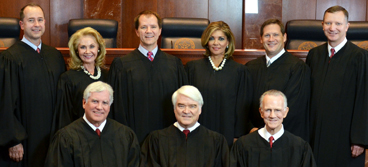© 2016 The Texas Lawbook.
By Janet Elliott
AUSTIN (Dec. 13) – The Texas Supreme Court has reversed course, deciding it will hear an energy company’s challenge to a $16 million arbitration award over drilling waste pollution on a South Texas ranch.
The neutrality of an arbitrator and the panel’s jurisdiction over the dispute are among the issues raised by Forest Oil, which is now part of Houston’s Sabine Oil & Gas Corporation. The company sought a rehearing after the Supreme Court in May declined to review the arbitration.
It’s the latest twist in a long-running dispute that has been before the Supreme Court previously, producing a 2008 decision that allowed the arbitration to proceed.
The energy company now says the arbitration panel never should have heard the dispute because the Legislature granted the Texas Railroad Commission exclusive jurisdiction over oil-and-gas waste disposal issues. The arbitration panel should have stayed its proceeding to permit the Railroad Commission to investigate, says the company.
Owners of the 27,000-acre McAllen Ranch in Hidalgo County say the latest appeal is a “last-ditch effort” to keep the case alive. They say there is no basis to claim that an arbitrator was biased merely because his office had been contacted about mediating a separate dispute involving another McAllen property. The arbitrator says he was unaware of the mediation inquiry and did not become involved.

“Even if it’s a trivial thing it’s always better practice to disclose in advance,” said Nolland. “When done in advance parties may not have a problem. After the fact, if they lose, they’ll look for any basis to attack the award.”
Suit: Rhino Pen Built with Radioactive Pipe
In a 2005 lawsuit, James Argyle McAllen, El Rucio Land and Cattle Company Inc. and two partnerships alleged that Forest Oil Corporation had contaminated soil and groundwater on the ranch. In addition, McAllen claimed he developed cancer, requiring his leg to be amputated, after he handled oilfield pipe contaminated with naturally occurring radioactive material. McAllen said that the company had donated the pipe for construction of pens for endangered rhinoceroses on the nearby Santillana Ranch.
Forest Oil moved to compel arbitration under a 1999 settlement agreement it had reached with McAllen in a separate royalties dispute. The ranch owners opposed the arbitration but the Supreme Court in 2008 decided the arbitration clause was enforceable.
After a 17-day hearing, two of three arbitrators found in favor of the ranch owners and awarded $15.5 million in actual damages and $500,000 in exemplary damages, plus $5 million in attorney’s fees.
B. Daryl Bristow, the arbitrator selected by Forest Oil, dissented. He said in a written opinion that the majority’s decision was not supported by the evidence and interfered with the Railroad Commission’s jurisdiction.
The trial court signed a final judgment for the $16 million in damages and increased the attorney’s fees to $6.8 million.
The First Court of Appeals in July 2014 affirmed the judgment. The court said that none of the statutes cited by Forest Oil clearly indicated the Legislature intended the Railroad Commission’s regulatory scheme to supplant a landowner’s right to obtain common-law relief for environmental contamination.

The Houston-based court also rejected Forest Oil’s complaint that arbitrator Donato Ramos failed to disclose a relationship with the McAllens in a related case. The parties disagreed about whether Ramos knew that he was being considered to mediate litigation filed by the McAllens against Chevron USA Inc. over alleged surface damage to the Santillana Ranch.
“Given the record, the evidence supported an implied finding by the trial court that Ramos was unaware of what had occurred in the Santillana litigation with respect to the parties’ consideration of him for the position of mediator,” the court of appeals said.
Hoskins Ruling Discussed
In their latest briefing, both sides discuss a Supreme Court opinion handed down one week after the court denied Forest Oil’s review petition. In that case, Hoskins v. Hoskins, the court took an expansive view of an arbitrator’s authority to issue a decision unsupported by law.
Forest Oil says Hoskins precludes some but not all of its arguments for vacating the award. The company says the court should decide whether the Legislature granted sole authority over contamination claims to the Railroad Commission to ensure that pollution is cleaned up.
“A private-damages scheme could not protect public health and safety or the environment, since nothing would compel the landowner to use the proceeds of a judgment for remediation,” says the company in a brief filed by Roger Townsend, a Houston partner at Alexander Dubose Jefferson & Townsend.
The McAllen Ranch owners, in their response, say the Supreme Court in Hoskins held that courts must confirm arbitration awards unless “vacatur” is required under a ground enumerated in the Texas Arbitration Act.
“Fundamentally, Forest’s arguments overlook the freedom of landowners to contract with oil companies for standards of conduct that are the same as or higher than agency standards, and for private enforcement of those agreed-upon standards by arbitration,” say the property owners in a brief filed by Warren Harris, head of Bracewell’s appellate practice.
On the neutrality issue, the energy company says the owners violated the arbitration agreement’s requirement that each side select one neutral arbitrator. The landowners say that Ramos was neutral because he never personally knew of the mediation offer in the other ranch case.
The Supreme Court also is reviewing whether the arbitrators exceeded their powers by awarding punitive damages.
© 2016 The Texas Lawbook. Content of The Texas Lawbook is controlled and protected by specific licensing agreements with our subscribers and under federal copyright laws. Any distribution of this content without the consent of The Texas Lawbook is prohibited.
If you see any inaccuracy in any article in The Texas Lawbook, please contact us. Our goal is content that is 100% true and accurate. Thank you.
